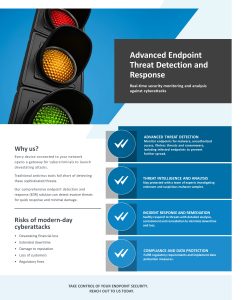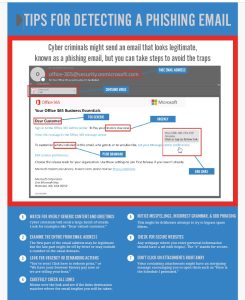
In a time where news of data breaches are becoming “the new normal,” the need for organizations to evaluate their overall risk and avoid becoming the next victim has become critical. Organizations simply can’t protect themselves from risks they’re unaware of. Additionally, many organizations are simply unsure where to start.
During a time where attackers are becoming more sophisticated and performing these attacks on a regular basis, it is imperative that organizations establish and maintain an information security program that allows them more flexibility on when and how often they can assess their environments.
As small and mid-sized businesses (SMBs) embrace new technological developments like the rise of artificial intelligence (AI), cloud computing, and the internet of things (IoT), they often overlook the security implications of digital transformation. This leaves many organizations vulnerable to cyber theft, scams, extortion, and countless other cyber crimes. As a result, two in three SMBs suffered a security breach in the last year and cyber attacks are becoming increasingly sophisticated, targeted, and damaging. With the average cost per incident exceeding $380,000 as it is, a single security breach can be detrimental to a small firm. It is, therefore, vital that SMBs begin prioritizing cyber security.
Cyber Security Facts & Statistics
- Data breaches exposed 4.1 billion records in the first half of 2019, a 54% increase over the first half of last year. Source: 2019 Risk Based Security Report
- Two in three SMBs suffered cyberattacks and data breaches in the past year. Source: 2019 Global State of Cybersecurity in Small and Medium-Sized Businesses by Keeper Security and Ponemon Institute
- Last year, 43% of reported data breaches involved small to mid-sized businesses (SMBs), so say what you will about cybercrime, but it does not discriminate. Source: Verizon (2019) PDF
- However, in comparison with larger organizations, SMBs usually have very few resources to draw on in order to protect themselves against cyber threats and to help them recover if they experience a security breach. In line with this, a 2019 survey found that 25% of SMBs suffering a data breach in the previous 12 months ended up filing for bankruptcy and 10% actually went out of business. Source: National Cyber Security Alliance (2019).
- According to a recent industry study, the biggest challenge preventing small companies from optimizing their security strategy is actually a lack of qualified staff, which affects a whopping 77% of SMBs. Source: Keeper Security & Ponemon Institute – 2019
- According to a recent study, a staggering 76% of US SMBs suffered a cyberattack last year, and 69% experienced a data breach. Source: Ibid.
- SMBs often need over a month to install critical patches affecting operating systems (35%) and third- party software (58%), putting them at risk of cyberattacks exploiting brand new vulnerabilities. Source: Kaseya – 2019
- Only 41% of small and mid-market firms enforce periodic password changes, just 38% prevent password reuse on internal systems and a mere 29% require a minimum password length. To make things worse, few companies regularly check if employee email accounts have been compromised in a data breach. Source: Keeper Security & Ponemon Institute – 2019
- Last year the vast majority of SMBs were targeted with exploits and/or malware that evaded their anti-virus (82%) and intrusion detection system (69%). Source: Keeper Security & Ponemon Institute – 2019
Penetration Test vs Vulnerability Test
A vulnerability assessment tells the customer that the door is unlocked; however, a penetration test tells the customer that, because the door is unlocked, we found an unlocked safe, unsecured jewellery, credit cards, and social security numbers lying around on the bed.
It also explains how you could secure the door next time, how to protect the confidential data lying around on the bed, and then some.
What a Vulnerability Test will find:
- Patching vulnerabilities
- Default passwords amongst services
- Configuration deficiencies
- False positive vulnerabilities (e.g. flagging services based on version numbers, not knowing if patches are applied)
What a Penetration Test will find:
- Weak domain user account passwords
- Sensitive files stored on network shares
- Sensitive data within databases
- Weak password policies
- Network share permission issues
- Man-in-the-middle attacks and possibilities
Network Penetration Testing will provide your business the assurance it needs to identify new ways that attackers will use to exploit and compromise sensitive data.
Our penetration testing service allows your business to perform ongoing security assessments of your environment without the challenges of traditional security assessments. These challenges include high costs, lack of flexibility in scheduling, long turnaround on reports, lack of comprehensiveness, and labour-intensive security assessments. By addressing these concerns, we help you add offensive security to strengthen your defences as well as improve your detection and monitoring controls.
Northern Star provides your team with a dashboard that allows them to track the penetration test and its activities in real-time. As more issues are identified and more information about the network is learned, information within the portal is updated to reflect the latest information, activities, and security threats identified from our cybersecurity team.
Click on the link below for more information and schedule your Penetration Test Today!











